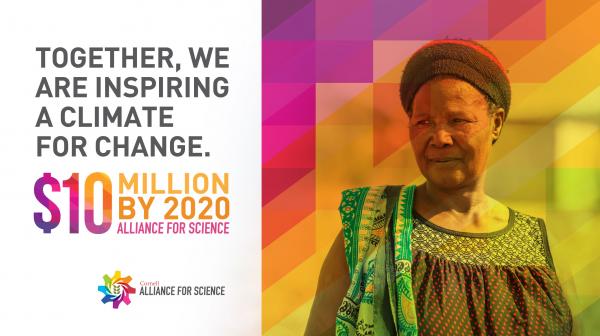
The Cornell Alliance for Science is launching a $10M-by-2020 campaign seeded with a $6.4 million grant from the Bill & Melinda Gates Foundation.
Funds raised during the campaign will support the Alliance s global efforts to ensure broad access to agricultural innovation, especially among small-holder farmers in developing nations.
Many of the most promising innovations have been developed in the public sector with a mission to improve the livelihoods of small-holder farmers, said Dr. Sarah Evanega, director of the Alliance for Science at Cornell University. All farmers should be able to choose whether or not to adopt these improved seeds and crops.
The Alliance trains champions in grassroots organizing through a series of short courses taught in partner countries, along with a 12-week Global Leadership Fellows program at Cornell University s Ithaca, NY, campus. The Alliance also produces and disseminates multimedia assets that tell the stories of scientists and farmers engaged in agricultural innovation initiatives around the world.
The Alliance was founded in 2014 with a $5.6 million grant from the Gates Foundation. It has since grown into a dynamic international network that has trained nearly 400 science advocates representing 35 nations. They work in their home countries to communicate more effectively about science and champion evidence-based agricultural policies.
The situation is increasingly urgent, with many countries at critical junctures in determining whether plant and animal science can help deliver food security and reduce the environmental damage caused by agriculture, Evanega said in explaining the rationale for the fundraising drive. We must be sure that science-based solutions don t bypass those living in poverty.
In keeping with its global mission, the Alliance has forged partnerships with numerous organizations and institutions. It has also built an international network of more than 9,000 science allies representing more than half the world s countries and all 50 US states.
One such partner is the Open Forum on Agricultural Biotechnology (OFAB). In the history of the world, nobody has ever made it without innovation, said Daniel Otunge, OFAB project manager. As a Kenyan, I appreciate that the Alliance for Science wants Africans to decide what innovations we will use. Africa is the most food-insecure continent in the world, the worst-hit by climate change. If technology is out there to help Africa feed itself, to help families survive, why not go for it?
Though the Bill & Melinda Gates Foundation has provided core support for the Alliance, other donors have made significant contributions to advance its work, including the Winkler Family Foundation and Ian Gazard, a member of the Alliance for Science Advisory Board.
As a molecular biologist I have long been aware of the potential benefits that genetic engineering could bring to agriculture, said Matt Winkler, president of the Winkler Family Foundation and founder and chairman of the diagnostic company Asuragen. I was appalled when I saw otherwise well-meaning organizations decide that these technologies were somehow intrinsically harmful, despite real world experience and scientific consensus to the contrary. I support the efforts of groups, such as the Cornell Alliance for Science, that are working to make these technologies accessible in the developing world. For example, scientists in Uganda already have engineered disease-resistant varieties of staple crops that could help to reduce poverty and hunger if they can just get these seeds into the hands of farmers.”
Evanega said the Alliance is heartened by the growing support of people who value science and justice and recognize the urgent need for action.
In the past six months, we have seen renewed commitment to evidence-based approaches from people all over the world through movements like the March for Science, Evanega said. In the next three years, we will be actively seeking Fellows and supporters who want to join the Alliance, tell their stories, and help us drive this climate for change.”
The Alliance for Science is based at Cornell University, a nonprofit organization. Donations are tax-deductible to the extent allowed by American law. Donations can be made here.
